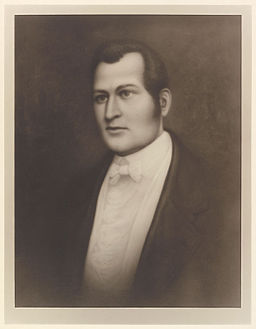Federal Judge James H. Peck Not Guilty of Abuse of Power

U.S. District Court for the District of Missouri Judge James H. Peck was the third judicial officer impeached by the U.S. House of Representatives. The Senate, however, found him not guilty of the abuse of power charges.
Federal Judgeship
Born in 1790, in Jefferson County, Tennessee, Peck fought during the War of 1812. After the conflict ended, he established a private law practice in Tennessee and later Missouri. In 1822, President James Monroe nominated Peck to serve on the United States District Court for the District of Missouri. Under 3 Stat. 653. H, Congress organized Missouri as one judicial district and authorized one judgeship for the U.S. district court. Peck served as a U.S. district court judge for U.S. District Court for the District of Missouri from 1822 to 1836.
Impeachment
Article III, Section 1 of the Constitution provides that judges “shall hold their Offices during good Behavior.” Meanwhile, Article II, Section 4 defines impeachment offenses as “Treason, Bribery, and other high Crimes and Misdemeanors.” Under Article I, the House of Representatives has “the sole Power of Impeachment” of federal officers, while the Senate has “the sole Power to try all Impeachments.”
Judge Peck faced impeachment for how he responded to a lawyer who criticized one of his decisions. In response to Peck’s ruling in a land dispute arising out of the Louisiana Purchase, attorney Luke Lawless published an anonymous letter that rebutted the judge’s legal reasoning.
After discovering his identity, Peck charged the attorney with contempt, ordered him to be imprisoned for 24 hours, and disbarred him for 18 months. The contempt order charged the lawyer with the following:
Intent to impair the public confidence in the upright intentions of said court, and to bring odium upon the court, and especially with intent to impress the public mind, and particularly many litigants in this court, that they are not to expect justice in the cases now pending therein.
The scorned attorney advocated for Peck to be impeached. At Peck’s subsequent impeachment trial, members of the House debated whether one incident of gross abuse of power rose to the level of impeachment. The House ultimately passed Articles of Impeachment after determining that his conduct was unjust, arbitrary, and beyond the scope of his duty.
The Senate acquitted Peck of the abuse of power charge, with just one vote separating the guilty and not guilty votes. He held his seat on the district court until his death in 1836.
For more information on Federal Impeachments, please visit the Impeachment of Federal Judges in our interactive Constitution section.
For a table of all Federal Judges that have been impeached please visit our Impeachment of Federal Judges page.
Previous Articles
SCOTUS Decision in Bowe v. United States Is First of the 2026 Term
by DONALD SCARINCI on February 5, 2026
In Bowe v. United States, 607 U.S. ___ (2026), the U.S. Supreme Court held that Title 28 U.S.C. § ...
SCOTUS Rules State Can’t Immunize Parties from Federal Civil Liability
by DONALD SCARINCI on January 29, 2026
In John Doe v. Dynamic Physical Therapy, LLC, 607 U.S. ____ (2025) the U.S. Supreme Court held that...
Supreme Court to Address Racial Discrimination in Jury Selection
by DONALD SCARINCI onWhile the U.S. Supreme Court has concluded oral arguments for the year, it continues to add cases t...
The Amendments
-
Amendment1
- Establishment ClauseFree Exercise Clause
- Freedom of Speech
- Freedoms of Press
- Freedom of Assembly, and Petitition
-
Amendment2
- The Right to Bear Arms
-
Amendment4
- Unreasonable Searches and Seizures
-
Amendment5
- Due Process
- Eminent Domain
- Rights of Criminal Defendants
Preamble to the Bill of Rights
Congress of the United States begun and held at the City of New-York, on Wednesday the fourth of March, one thousand seven hundred and eighty nine.
THE Conventions of a number of the States, having at the time of their adopting the Constitution, expressed a desire, in order to prevent misconstruction or abuse of its powers, that further declaratory and restrictive clauses should be added: And as extending the ground of public confidence in the Government, will best ensure the beneficent ends of its institution.





